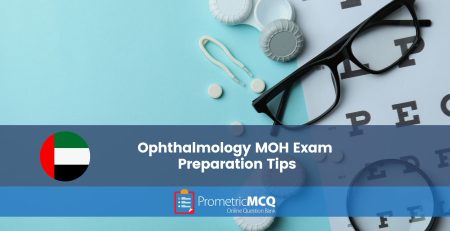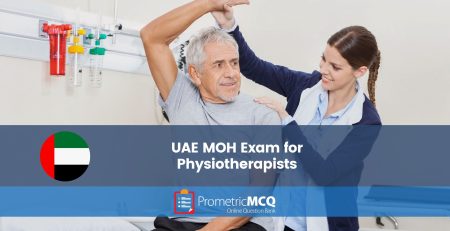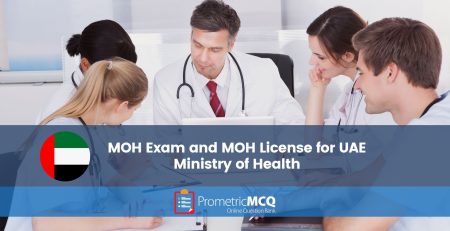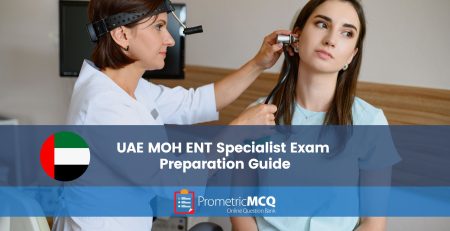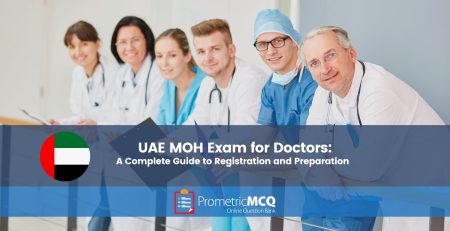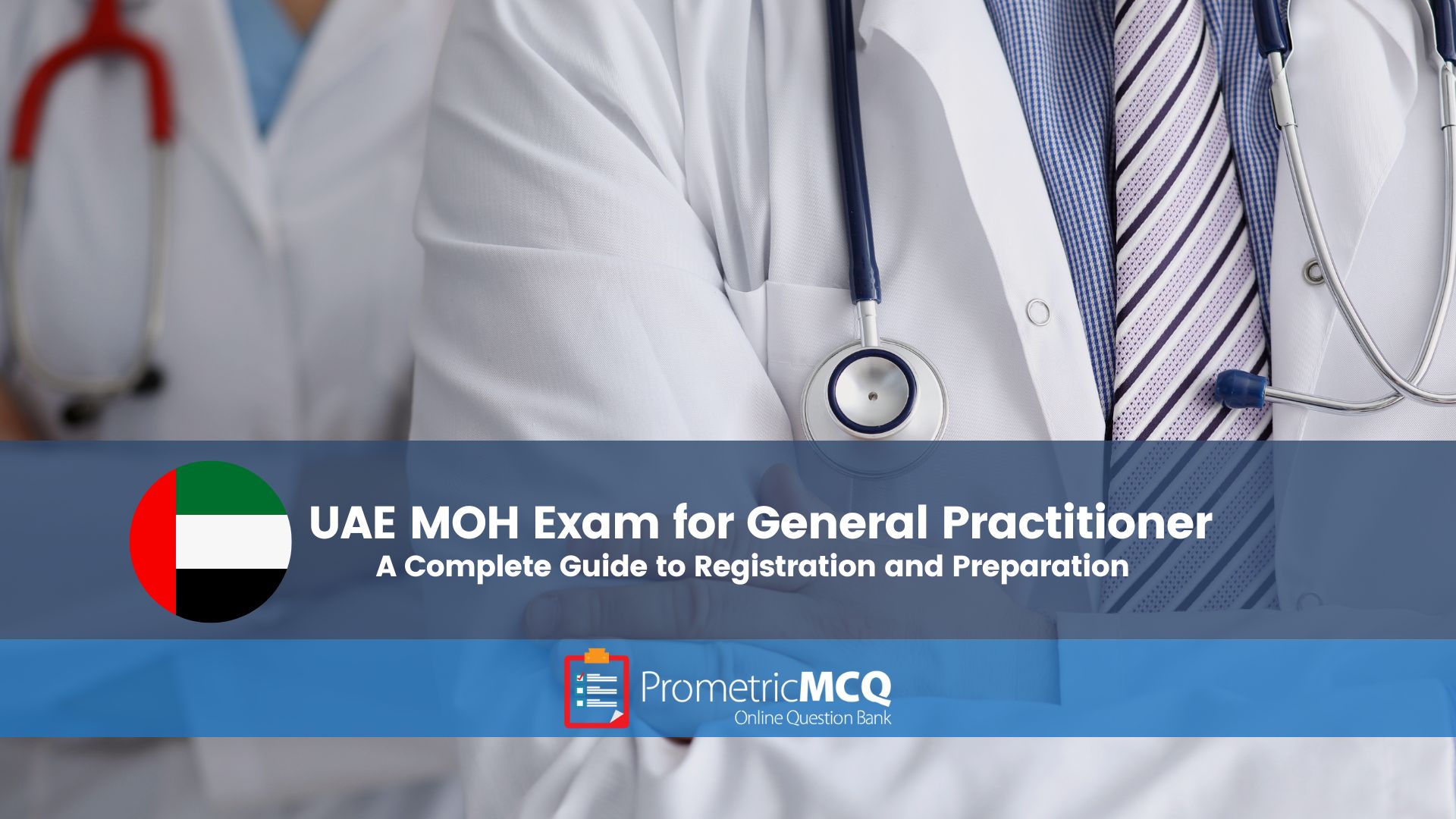
UAE MOH Exam for General Practitioner
Webmaster2024-03-19T15:03:44+00:00Are you ready to take your medical career to the next level by appearing for the Ministry of Health MOH Exam for General Practitioner in the UAE? Navigating the intricacies of this standardized exam is crucial for general practitioners aiming to practice in the Emirates. Let’s delve into a comprehensive guide that unveils everything you need to know about the MOH exam for General Practitioner: from the exam pattern to eligibility criteria, fees, and essential dates.
**What to Expect on Your MOH Exam for General Practitioner Journey:**
- Understanding the MOH exam for General Practitioner pattern and syllabus to prepare effectively.
- Unveiling the eligibility criteria for aspiring general practitioners in the UAE.
- Step-by-step guide on the application process and necessary documentation.
- Insider tips and resources to ace the MOH exam and excel in your medical career.
Mastering the MOH exam is more than just a milestone; it’s a gateway to realizing your dream of practicing as a general practitioner in the UAE’s dynamic healthcare landscape. Let’s embark on this enlightening journey together.
Table of Contents
ToggleIntroduction to MOH Exam for General Practitioner
The UAE Ministry of Health – MOH Exam for General Practitioner holds great importance for general practitioners aspiring to practice in the United Arab Emirates (UAE). It is a standardized exam that evaluates the knowledge and skills of healthcare professionals to ensure high-quality healthcare services in the country.
The MOH Exam for General Practitioners is a crucial step towards obtaining a medical license in the UAE and is designed to assess the competency of general practitioners in various medical disciplines. Passing this exam is mandatory for those seeking employment in healthcare facilities regulated by the MOH GP.
By successfully clearing the MOH Exam GP Exam, aspiring general practitioners showcase their expertise and earn the recognition necessary to provide their services in the UAE. This exam validates their qualifications and helps maintain the standard of healthcare services in the country.
Understanding the significance of the MOH Exam is essential for general practitioners looking to pursue their careers in the UAE. In the following sections, we will delve deeper into the eligibility criteria, exam pattern, application process, and preparation tips to help aspiring doctors navigate this important milestone successfully.
Remember, the MOH Exam opens up opportunities for general practitioners to contribute to the UAE healthcare industry and make a positive impact on patient care. Let’s explore the requirements and preparations necessary to excel in this exam.
Eligibility Criteria for the MOH Exam for General Practitioner
To apply for the MOH exam as a general practitioner in the UAE, there are certain minimum requirements and eligibility criteria that you need to fulfill. These criteria ensure that only qualified and competent healthcare professionals are granted the opportunity to practice medicine in the UAE. Here are the key eligibility criteria for the MOH exam:
- Medical Qualification: You must possess a recognized medical qualification from a reputable institution. This includes a basic medical degree such as MBBS, MD, or equivalent.
- Years of Experience: The MOH requires a minimum 3 years of experience include internship in the field of medicine. Typically, you need to have a minimum of two years of clinical experience as a general practitioner after completing your medical degree and 1 year of internship.
- Licensure of Healthcare Professional: Before applying for the MOH exam, you must hold a valid medical license from your home country or any other country where you have previously practiced medicine. This license should be free from any disciplinary actions or restrictions.
- Primary Source Verification: The MOH verifies your medical qualifications and documents through a process called Primary Source Verification (PSV). This verification ensures the authenticity and validity of your academic credentials and professional experience.
- Good Standing: You need to provide evidence of good standing in the healthcare profession, both in terms of ethics and conduct. This includes having a clean professional record with no history of malpractice or disciplinary actions.
It’s important to note that these eligibility criteria may vary based on the specific requirements set by the Ministry of Health in the UAE. It is advisable to refer to the official MOH website or consult the relevant authorities for the most up-to-date and accurate information regarding eligibility requirements.
Remember, meeting the eligibility criteria is just the first step towards appearing for the MOH exam. It is essential to thoroughly understand the requirements and ensure you have all the necessary documentation and qualifications before applying. By fulfilling these criteria, you can position yourself as a competent and eligible candidate for the MOH exam and enhance your prospects of a successful career as a general practitioner in the UAE.
MOH Exam Pattern and Fees
The MOH exam for general practitioners in the UAE follows a specific pattern and requires candidates to meet certain eligibility criteria. Understanding the exam pattern and fees is crucial for aspiring doctors who wish to excel in their careers. Here’s a breakdown of the MOH exam pattern and the associated fees:
Exam Pattern
- Number of Questions: The MOH exam consists of a set number of questions that candidates need to answer within a specified time frame.
- Format: The exam is conducted in a multiple-choice format, where candidates must select the correct answer from the provided options. This format allows for efficient and standardized evaluation.
- Duration: The total duration of the MOH exam varies depending on the specific discipline. Generally, candidates are given a predefined time limit to complete the exam.
It is essential for candidates to thoroughly understand the exam pattern to prepare effectively. By familiarizing themselves with the format and structure of the MOH exam, they can develop effective strategies to maximize their scores.
Exam Fees
To participate in the MOH exam, candidates need to pay the required fees. The exact fees vary depending on factors such as the specialty and level of the examination. Candidates will be notified of the specific fee structure during the registration process.
Paying the exam fees is a necessary step to complete the application process. It is important for candidates to ensure that they have the necessary funds available to cover the fees before initiating the registration process.
In summary, the MOH exam follows a specific pattern and requires candidates to pay the necessary fees. Understanding the exam pattern and being aware of the associated fees is crucial for general practitioners in the UAE who are planning to pursue opportunities in the healthcare industry. By preparing well and paying the fees on time, candidates can set themselves up for success in the MOH exam.
Syllabus for the MOH Exam (150 words)
The MOH exam for general practitioners in the UAE covers various key topics and subject areas to assess their knowledge and competence in delivering quality healthcare. Familiarizing yourself with the syllabus is crucial for effective preparation. Here are the main subject areas covered in the MOH exam:
1. Medical Science: This section focuses on core medical knowledge, including anatomy, physiology, biochemistry, pathology, and microbiology.
2. Clinical Medicine: The clinical medicine segment evaluates your understanding of common medical conditions, diseases, and their diagnostic and treatment approaches.
3. Pharmacology: This section tests your knowledge of drugs, their uses, interactions, and potential side effects.
4. Community Medicine: Community medicine assesses your understanding of public health, epidemiology, preventive medicine, and healthcare management.
5. Medical Ethics and Laws: This topic covers ethical principles, patient rights, informed consent, and legal aspects of medical practice.
6. Professional Skills: The exam also evaluates your proficiency in patient communication, medical record keeping, and clinical decision-making.
To perform well in the MOH exam, it is essential to study these subjects thoroughly and ensure a strong foundation in general medical knowledge and practical skills.
Remember, this brief overview provides an idea of the syllabus. It is advisable to refer to the official MOH exam resources and study materials for a more detailed and comprehensive understanding of the topics covered.
Application Process and Required Documents
To apply for the MOH exam as a general practitioner in the UAE, you need to follow a step-by-step process and submit the required documents. Here’s a guide to help you navigate through the application procedure smoothly:
1. Check your eligibility: Before starting the application process, make sure you meet the minimum requirements set by the Ministry of Health. These requirements typically include having a valid medical degree, relevant work experience, and a license from the applicant’s home country.
2. Create an account: Visit the official MOH website and create an account on the online licensing system. Fill in the necessary personal information and choose your desired examination date, center, and specialty.
3. Submit required documents: Prepare the required documents to support your application. These documents may vary based on your specific circumstances, but commonly include:
– Valid passport or Emirates ID
– Copy of your medical degree and transcripts
– Certificate of good standing from your medical licensing authority
– Letter of sponsorship or employment contract (if applicable)
– Proof of work experience, such as employment certificates or recommendation letters
– Recent passport-sized photographs
4. Complete the dataflow process: The MOH requires candidates to go through a primary source verification process conducted by the DataFlow Group. Submit all relevant documents and pay the necessary fees to initiate the verification process.
5. Pay the exam fees: Once the verification process is complete, you will receive an email notification. Proceed to pay the exam fees, which can be done online through the MOH website. Keep the payment receipt for future reference.
6. Schedule the exam: After paying the fees, you can select your preferred date and time for the exam. Choose a slot that best suits your availability and consider giving yourself enough time to prepare adequately.
7. Download the admit card: Before the exam, download your admit card from the MOH website. This card will contain important details, such as your exam center location and reporting time. Remember to carry a printout of the admit card on the day of the exam.
8. Appear for the exam: On the day of the exam, arrive at the designated center well before the reporting time mentioned on your admit card. Follow the instructions provided by the exam officials and complete the exam within the given time frame.
By following these steps and submitting the required documents, you can successfully apply for the MOH exam as a general practitioner in the UAE. Make sure to double-check the specific requirements and processes on the official MOH website for the most up-to-date information.
> “The journey of starting your career as a general practitioner in the UAE begins with a thorough understanding of the application process and the documents required. By following the step-by-step guide provided above, you can ensure a smooth application experience and confidently move forward in your professional aspirations.”
Preparation Tips for the MOH Exam for General Practitioner
Preparing effectively for the MOH Exam for General Practitioner is crucial to increase your chances of success. Here are some valuable tips and resources to help you in your preparation journey:
1. Understand the Exam Pattern and Syllabus
Before diving into your preparation, familiarize yourself with the MOH Exam for General Practitioner pattern and syllabus. This will give you a clear idea of what to expect and ensure that you cover all the relevant topics. The exam typically consists of multiple-choice questions (MCQs) and may cover areas such as general medicine, pediatrics, gynecology, and more.
2. Gather Study Materials and Resources
Collect the necessary study materials and resources to aid your preparation. This can include textbooks, medical journals, online courses, and practice question banks specifically designed for the MOH exam. Make sure to choose reliable and up-to-date sources that align with the exam syllabus.
3. Practice with Mock Tests
Take advantage of practice tests and mock exams to simulate the actual testing environment. This will help you become familiar with the exam format and improve your time management skills. Additionally, practicing with mock tests will allow you to assess your strengths and weaknesses, enabling you to focus on areas that require more attention.
4. Join Study Groups or Coaching Classes
Consider joining study groups or enrolling in coaching classes for the MOH exam. Collaborating with fellow aspirants can provide a supportive learning environment where you can exchange knowledge, discuss difficult concepts, and motivate each other. Coaching classes led by experienced instructors can also provide valuable guidance and insights.
5. Create a Study Schedule
Develop a study schedule that suits your needs and allows for consistent and focused preparation. Break down the syllabus into manageable sections and allocate dedicated time for each topic. Stick to your schedule and avoid procrastination to make progress steadily.
6. Review and Revise Regularly
Regularly review and revise the topics you have covered to reinforce your understanding and retention. Create summary notes or flashcards to aid quick revision. Focus on key concepts, medical terminology, and treatment guidelines. Make use of mnemonic techniques to remember complex information more easily.
7. Take Care of Yourself
Maintain a healthy lifestyle during your preparation period. Ensure you get enough sleep, eat balanced meals, and engage in regular physical activity. Taking care of your well-being will improve your concentration, memory, and overall performance during the exam.
Remember, effective preparation is not only about acquiring knowledge but also about understanding and applying it. Stay motivated, stay focused, and believe in your ability to succeed in the MOH exam. Best of luck!
Success Stories and Testimonials
Here are some inspiring success stories and testimonials from general practitioners who have cleared the MOH exam and achieved professional growth in the UAE healthcare industry:
1. Dr. Ahmed’s Journey to Success:
“I had always dreamt of practicing medicine in the UAE, and clearing the MOH exam was the first step towards making that dream a reality. With diligent preparation and the support of renowned study materials, I was able to crack the exam with flying colors. The MOH exam not only validated my medical knowledge but also opened doors for career opportunities and growth in the UAE’s healthcare sector.”
2. Dr. Fatima’s Remarkable Achievement:
“Clearing the MOH exam was a turning point in my medical career. The exam challenged me to showcase my expertise and dedication to patient care. It was a rigorous process, but with the right guidance and focused preparation, I successfully passed the exam. The MOH certification has not only enhanced my professional reputation but has also provided me with tremendous job prospects and the opportunity to serve a diverse patient population.”
3. Dr. Abdullah’s Testimonial:
“The MOH exam allowed me to demonstrate my competence as a general practitioner and provided me with a gateway to practice medicine in the UAE. Through the extensive preparation offered by preparatory courses and practice tests, I gained the confidence and knowledge necessary to excel in the exam. Successfully clearing the MOH exam has been a significant achievement in my career and has opened doors to prestigious healthcare institutions in the UAE.”
These success stories and testimonials exemplify the rewarding experiences of general practitioners who have conquered the challenges of the MOH exam and found professional fulfillment in the vibrant healthcare industry of the UAE.
Remember, with dedication, perseverance, and the right resources, you too can join the ranks of successful medical professionals in the UAE.
“Clearing the MOH exam was a turning point in my medical career. The exam challenged me to showcase my expertise and dedication to patient care.” – Dr. Fatima
FAQs about the MOH Exam for General Practitioner
Here are some frequently asked questions about the MOH Exam for general practitioners in the UAE:
The MOH Exam for General Practitioners is a professional licensure examination conducted by the Ministry of Health (MOH) in various countries. This exam is designed for medical doctors who wish to practice as General Practitioners or family doctors within the country’s healthcare system.
The MOH Exam for General Practitioners plays a critical role in maintaining the quality of healthcare services, ensuring that practitioners have the necessary knowledge and skills to provide primary care and handle a variety of medical conditions effectively.
The eligibility criteria for the United Arab Emirates (UAE) Ministry of Health – MOH exam for general practitioners are designed to ensure that candidates possess the necessary qualifications and experience to practice medicine in the UAE. The key criteria typically include:
-
Educational Qualification: Candidates must have completed a medical degree (MBBS, MD, or equivalent) from a recognized medical school.
-
Internship: A mandatory internship period, usually one year, is required after completing the medical degree.
-
Clinical Experience: Candidates are often required to have a at least 2 (two) years of post-internship clinical experience, depending on the specific regulations at the time of application.
-
Professional License: Applicants must hold a valid medical license or registration from their home country or the country where they have been practicing.
-
Good Standing Certificate: A certificate of good standing or a similar document from the medical licensing authority where the candidate has been practicing is typically required.
-
No History of Malpractice: A clean professional record with no history of malpractice or ethical violations is crucial.
-
Passport and Visa Requirements: Valid passport and appropriate visa arrangements are necessary for international candidates.
It’s important to note that the eligibility criteria can be subject to change, and there may be additional requirements or variations depending on the specific health authority within the UAE (e.g., Dubai Health Authority, Health Authority of Abu Dhabi, or the Ministry of Health). Therefore, it’s advisable for candidates to check the most current information from the official website of the UAE MOH or the relevant health authority to ensure compliance with all the current requirements.
Applying for the UAE Ministry of Health – MOH Exam for General Practitioners typically involves a series of steps. The exact process can vary depending on the country and the specific health authority overseeing the exam. However, a general guideline for the application process is as follows:
-
Check Eligibility: Ensure you meet all the eligibility criteria for the MOH Exam for General Practitioners in the specific country or region.
-
Gather Required Documents: Collect all necessary documentation, which may include your medical degree certificate, internship completion certificate, proof of clinical experience, a valid medical license, a good standing certificate from your medical council, passport-size photographs, a valid passport, and any other required documents.
-
Online Registration/Application: Visit the official website of the MOH or the relevant health authority. Create an account and fill in the online application form. Upload the required documents and provide all necessary personal and professional details.
-
Application Review: After submitting your application, it will typically undergo a review process. You may be asked to provide additional information or clarification.
-
Pay the Exam Fee: Once your application is approved, you will be required to pay the examination fee. This fee varies depending on the country and the specific exam.
-
Schedule Your Exam: After payment, you will be able to schedule your exam. Exam dates and venues can usually be selected based on availability.
-
Prepare for the Exam: Engage in self-study or enroll in a preparation course. Study materials and guidelines are often available on the official MOH website or through various educational platforms.
-
Attend the Exam: On the day of the exam, arrive at the test center with the required identification and any other necessary materials.
-
Await Results: After taking the exam, wait for the results to be announced. The results are typically released within a few weeks after the exam date.
-
Further Steps: If you pass the exam, follow the subsequent steps for obtaining your practice license. This may involve additional documentation and procedures.
Remember, these steps are general guidelines and the exact process can vary. It’s important to refer to the official MOH website or contact the relevant health authority for the most accurate and detailed information, particularly as procedures and requirements can change over time.
The format of the MOH (Ministry of Health) Exam for General Practitioners can vary depending on the country and the specific health authority administering the exam. However, most MOH exams share some common characteristics in their format:
-
Computer-Based Testing (CBT):
- The Computer based test (CBT) usually consists of multiple-choice questions (MCQs).
- These questions typically cover various aspects of general medicine, including internal medicine, surgery, pediatrics, obstetrics and gynecology, psychiatry, and sometimes public health.
- The number of questions and the time allotted for the exam can vary. Commonly, exams may have anywhere from 100 to 200 questions, with a duration of 2 to 3 hours.
Candidates preparing for the MOH Exam for General Practitioners should check the specific format and guidelines provided by the health authority or the MOH of the respective country. This information is usually available on the official MOH website or through official communication channels of the health ministry. Preparation should be aligned with the format, focusing on both theoretical knowledge and practical clinical skills.
The MOH (Ministry of Health) Exam for General Practitioners covers a broad range of medical subjects, reflecting the diverse knowledge base required for general practice. The exam typically includes questions from the following areas:
-
Internal Medicine: This encompasses a wide range of conditions affecting the internal organs. Topics include cardiology, gastroenterology, endocrinology, nephrology, pulmonology, hematology, rheumatology, and infectious diseases.
-
Pediatrics: Questions related to child health, including neonatology, developmental milestones, pediatric diseases, vaccinations, and common pediatric emergencies.
-
Obstetrics and Gynecology: This covers women’s reproductive health, pregnancy, childbirth, and disorders of the female reproductive system.
-
Surgery: Basic surgical principles, common surgical emergencies, and postoperative care are included, though detailed surgical techniques are generally not the focus for general practitioners.
-
Psychiatry: Mental health topics, including common psychiatric disorders, their diagnosis, and management.
-
Emergency Medicine: Management of acute and urgent aspects of illnesses and injuries that require immediate attention.
-
Family Medicine: This includes preventive healthcare, management of chronic diseases, patient education, and holistic care.
-
Public Health and Epidemiology: Principles of public health, preventive medicine, and the understanding of diseases at a population level.
-
Clinical Pharmacology: Knowledge of common medications, their indications, contraindications, side effects, and interactions.
-
Ethics and Professionalism: Understanding of medical ethics, legal aspects of medicine, and professional conduct.
-
Communication Skills: Basic communication skills necessary for patient interaction, including taking medical histories and providing explanations of medical conditions and treatments.
The MOH Exam for General Practitioners focuses on the application of this knowledge to clinical scenarios, testing both theoretical understanding and practical skills. The specific weightage of each subject can vary, and the exam format might include multiple-choice questions, case-based scenarios, and/or oral examinations, depending on the specific guidelines of the MOH conducting the exam. It’s always recommended to check the latest exam syllabus and format from the official MOH website or related authorities for the most current and detailed information.
The passing score for the MOH Exam for General Practitioners varies depending on the specific health authority administering the exam and the country. Generally, it’s set as a percentage or mark-based system, often ranging between 60% to 70%, but this can differ.
It’s important to check the current guidelines from the specific MOH or relevant health authority for the most accurate information, as these criteria can be periodically reviewed and revised to maintain the standard and relevance of the examination.
This information is typically available on the official MOH website or in the exam notification.
Yes, online courses and mock exams are available for the MOH Exam for General Practitioners. One such resource is prometricmcq.com, which offers a range of study materials and practice questions tailored to the MOH Exam. These online platforms typically provide:
-
Mock Exams: Simulated tests that mirror the format and style of the actual MOH Exam, helping candidates familiarize themselves with the exam structure and timing.
-
Practice Questions: A collection of sample questions or a question bank covering various topics included in the MOH Exam syllabus.
-
Study Materials: Comprehensive notes, summaries, and reference materials that cover key subjects relevant to the MOH Exam.
-
Interactive Learning Tools: Some platforms may offer interactive learning modules, videos, and other multimedia resources.
-
Performance Tracking: Tools to monitor your progress, identify strengths and weaknesses, and focus your study efforts accordingly.
Remember, while such resources can be incredibly helpful, it’s important to ensure that the content is up-to-date and aligns well with the latest MOH Exam syllabus and format. Additionally, complementing these resources with standard textbooks and guidelines is often recommended for a well-rounded preparation.
To prepare effectively for the MOH Exam for General Practitioners, subscribing to MCQs from PrometricMCQ.com can be a beneficial part of your study plan. Here are some steps to incorporate this resource into your preparation strategy:
-
Understand the Exam Format and Syllabus: Before starting your preparation, familiarize yourself with the exam format, types of questions, and the syllabus covered in the MOH Exam.
-
Subscribe to PrometricMCQ.com: This website offers a wide range of multiple-choice questions (MCQs) that are specifically tailored for the MOH Exam. Subscribing will give you access to these valuable resources.
-
Regular Practice: Use the MCQs to practice regularly. This will help you get accustomed to the style of questions and improve your time management skills.
-
Identify Weak Areas: As you practice, take note of areas where you struggle. Focus more on these topics to strengthen your overall knowledge.
-
Review Explanations: Don’t just practice the questions; make sure to read and understand the explanations provided for each answer. This helps in clarifying concepts and understanding the reasoning behind correct answers.
-
Complement with Textbooks and Guidelines: While MCQs are great for practice, complement them with standard medical textbooks and clinical guidelines for a comprehensive understanding of the subjects.
-
Mock Tests: Take full-length mock exams under timed conditions to simulate the actual exam experience. This will help in building endurance and test-taking strategy.
-
Stay Updated: Ensure that the material you are studying, especially from online sources, is up-to-date and in line with the current MOH Exam syllabus.
-
Time Management: Develop a study schedule that allows you to cover all topics systematically, with enough time for review and revision.
-
Health and Balance: Don’t forget to take care of your health during preparation. Balanced nutrition, adequate sleep, and stress management techniques can improve your study efficiency.
By following these steps and consistently engaging with the study materials, you can enhance your chances of success in the MOH Exam for General Practitioners. Remember, diligent and systematic preparation is key to doing well in these competitive exams.
Yes, there are several recommended textbooks and resources that can be very helpful for preparing for the MOH Exam for General Practitioners. These resources cover a wide range of medical topics and are designed to provide comprehensive knowledge beneficial for the exam. Here are some key recommendations:
-
Davidson’s Principles and Practice of Medicine: A comprehensive textbook covering a wide array of medical conditions, it’s known for its clear explanations and clinical focus.
-
Oxford Handbook of Clinical Medicine: This is a go-to resource for many practitioners and covers clinical examination and practical skills along with essential medical knowledge.
-
Kumar and Clark’s Clinical Medicine: Renowned for detailed and reader-friendly content, this book offers in-depth information on various medical specialties.
-
USMLE Step 2 CK Lecture Notes (Kaplan Test Prep): Although designed for the USMLE, these books provide a solid foundation in internal medicine, surgery, pediatrics, obstetrics and gynecology, and psychiatry.
-
“Essentials of Family Medicine” by Philip D. Sloane et al.: This book is particularly useful for its focus on family medicine, a key component of general practice.
-
BMJ, JAMA, and NEJM Journals: Keeping up-to-date with current medical journals like the British Medical Journal, Journal of the American Medical Association, and the New England Journal of Medicine is beneficial for the latest developments and research in medicine.
-
Online Medical Databases: Resources like UpToDate, Medscape, and the Cochrane Library provide current medical information and are valuable for quick reference and staying updated.
-
Clinical Guidelines: Refer to the clinical practice guidelines recommended by recognized health organizations for various diseases and conditions.
-
Mock Tests and MCQ Books: Utilize books with practice questions and mock tests specific to the MOH Exam format. These are particularly useful for familiarizing yourself with the exam pattern and time management.
-
PrometricMCQ.com: As previously mentioned, this website offers a range of MCQs and is specifically tailored for MOH Exam preparation.
Remember, while these resources are beneficial, the best approach is to use them in combination with a thorough understanding of the exam format, regular practice, and consistent study. Different candidates may find certain resources more helpful than others, so it’s a good idea to explore a few and determine what works best for your study style.
Applying for an MOH (Ministry of Health) license to practice as a General Practitioner generally involves several key steps. While the specific process can vary by country or region, here’s a general overview of the procedure:
-
Meet Eligibility Criteria: Ensure you meet all the necessary qualifications, including educational requirements, relevant clinical experience, and any other specific criteria set by the MOH.
-
Pass the MOH Exam: Successfully complete the MOH examination for General Practitioners. This might include both theoretical and clinical assessments.
-
Document Collection: Gather required documents, typically including your medical degree, internship completion certificate, proof of experience, a valid medical license from your home country, good standing certificate, passport-size photos, and a copy of your passport.
-
Primary Source Verification: Some MOH authorities require primary source verification of your educational and professional credentials through services like DataFlow.
-
Online Application: Submit your application through the official MOH portal. This usually involves creating an account, filling in your personal and professional details, and uploading the necessary documents.
-
Payment of Fees: Pay the applicable fees for the licensure process. The amount and payment method can vary.
-
Evaluation of Application: The MOH will review your application. This may include verifying your documents and credentials.
-
Attend an Interview (if required): In some cases, you might be required to attend a face-to-face or virtual interview with the MOH officials.
-
Receive Your License: Upon successful completion of all steps and approval of your application, you will be issued an MOH license to practice as a General Practitioner.
-
Regular Renewal: Be aware that MOH licenses need regular renewal, and this might include continuing medical education or other requirements.
Always refer to the specific guidelines provided by the MOH in the country or region where you wish to practice, as procedures, requirements, and regulations can change. Additionally, consider reaching out to local health authorities or professional bodies for guidance and any recent updates to the licensure process.
Apply for UAE MOH License
Get UAE MOH Prometric Exam Preparation and Licensing Services



